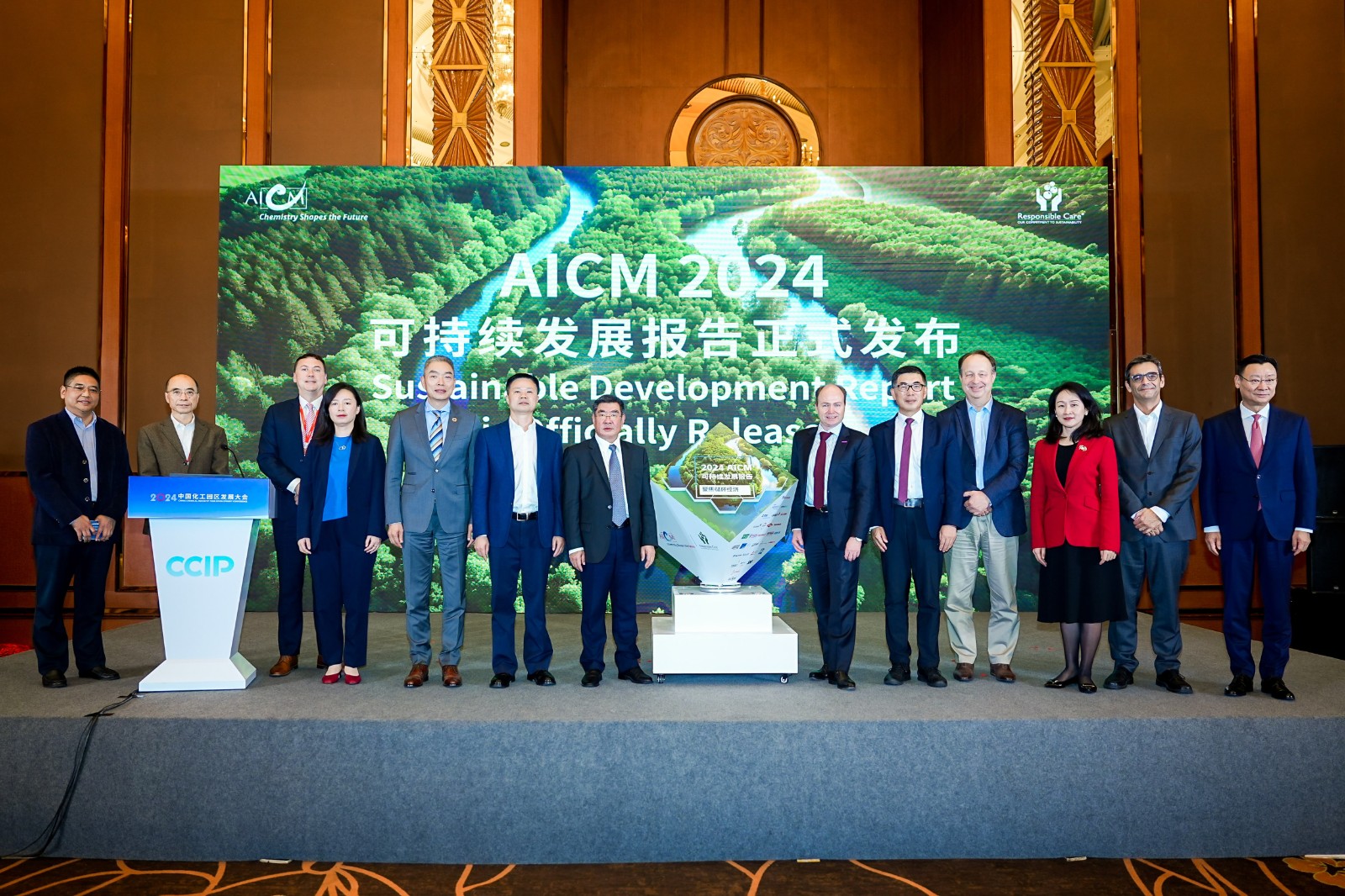The theme of this year's report is "Focusing Circular Economy." Through research, it analyzes the primary implementation pathways of Circular Economy among member companies, including the current status and initiatives in material innovation, green manufacturing, recycling, and reuse, while discussing the challenges faced and potential opportunities. We sincerely hope that the AICM 2024 Sustainable Development Report will provide reference and insights into the sustainable development direction of the industry and the trends of regulations and policies, enabling all sectors of society to have a more comprehensive and objective understanding of the positive role of the chemical industry in promoting a harmonious society and driving green development.
AICM believes that the effective implementation of a Circular Economy by enterprises is a crucial pathway for the sustainable development of the chemical industry. The 2024 report introduces the relationship between Responsible Care®, sustainable development, and the Circular Economy. It outlines and interprets policies related to the Circular Economy in the chemical industry, explores implementation pathways and measures taken by the industry, and points out the challenges and opportunities faced in the transition to a Circular Economy. Finally, it shares proactive and innovative practices of AICM member companies.

Pathways and Measures: Material Innovation, Green Manufacturing, Recycling, and Reuse
In the chemical industry, the implementation of a Circular Economy cannot be separated from the support of process and product innovation. Process and product innovation not only drive resource conservation and efficient utilization but also promote waste reduction and recycling, reducing the impact of economic activities on natural resources and providing a powerful impetus for the development of a Circular Economy in the chemical industry. AICM member companies have made significant progress in material innovation, green manufacturing, recycling, and reuse. By strengthening systems and management, transitioning from a linear to a Circular Economy, AICM is committed to driving the chemical industry towards a greener, more environmental-friendly, and sustainable direction.
New Green Opportunities: Technology, Brand, Market
In the context of carbon peaking and neutrality, the Circular Economy, as an economic growth model centered on efficient resource utilization and recycling, provides a pathway for enhancing the resilience of the chemical industry. However, the chemical industry still faces numerous bottlenecks and challenges in developing a Circular Economy, including incomplete policy support, insufficient economic incentives, technological difficulties, low market acceptance due to green premiums on products, difficulties in implementing full lifecycle recycling management systems, and a lack of relevant talent or experienced personnel.
As the landscape of the chemical industry continues to evolve, new business models are gradually emerging. Therefore, grasping the pulse of Circular Economy development, actively addressing challenges, and converting crises into opportunities are important topics for the current and future development of the chemical industry. The report shows that among the surveyed member companies, 93% believe that the transition to a Circular Economy will motivate opportunities for technological progress and innovation and enhance the company's brand image; 85% believe that the transition will help enterprises explore new markets; and 78% recognize the importance of the transition for strengthening relationships with governments and partners.
AICM member companies can fully leverage their leading roles in the international chemical industry, converting advanced technology, rich management experience, and powerful innovation capabilities into practical drivers for promoting the green transformation of the chemical industry in China and even globally.
AICM Suggestions: Policy Guidance, Enterprise Collaboration, Innovative Business Models
As the global consensus on environmental protection and sustainable development deepens, the development of a Circular Economy in the chemical industry, as one of the important pillars of the national economy, is not only crucial for the industry's own green transformation but also an important engine for achieving the "carbon peaking and neutrality" goals.
In response to these challenges and opportunities, AICM proposes suggestions for policy guidance and enterprise response to jointly promote a Circular Economy and innovative business models, helping member companies steadily advance on the path of Circular Economy transformation. Specific measures include building circular supply chains, strengthening recycling and reuse mechanisms, extending product lifecycle declarations, and establishing cross-industry cooperation mechanisms.
As an important platform connecting enterprises, governments, and communities, AICM bears responsibilities in promoting the development of a in the chemical industry. On the one hand, AICM will focus on building a coordinated cooperation network among member companies, pooling industry forces, continuously promoting circular technology innovation, and forming more replicable and promotable Circular Economy development models and experiences. On the other hand, AICM will actively facilitate dialogues among government departments, sustainable development institutions, and various stakeholders in the chemical industry value chain to jointly address issues and challenges encountered in the development of a Circular Economy, promoting the formation of a more complete and efficient Circular Economy system. At the same time, AICM will strengthen the popularization of the Circular Economy concept, raise public awareness and participation in the importance of a Circular Economy, and form a favorable atmosphere for the whole society to jointly promote the development of a Circular Economy.
About the AICM Sustainable Development Report:
Since its first release in 2019, the AICM Sustainable Development Report has been collecting information through surveys to understand the actions and strategic directions taken by member companies in carbon neutrality and carbon reduction, with continued focus on the series of actions and strategies implemented across Scope 1, 2, and 3 carbon emissions. AICM member companies continuously invest in the research and development of innovative chemical products and technologies, through various means such as expanding the application of renewable energy, developing more sustainable solutions, and expanding the market application of renewable products. These efforts not only drive the development of enterprises themselves but also provide strong support for the green transformation of the Chinese chemical industry.
Achieving sustainable development requires the joint efforts of all sectors of society. AICM will continue to play a bridging role, facilitating effective communication between chemical companies in China and policymakers, assisting companies in addressing challenges, and jointly promoting the sustainable development of the chemical industry.
![]() 2024 AICM Sustainable Development Report.pdf
2024 AICM Sustainable Development Report.pdf



